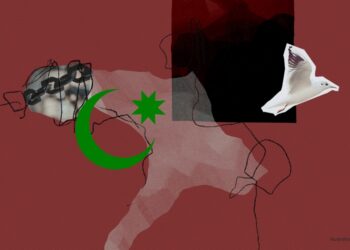
Listen to the article․
Azerbaijan’s strategic partnership with Israel is widely acknowledged. A 2009 U.S. diplomatic cable released by WikiLeaks noted that their ties are “based strongly on pragmatism” with mistrust of Iran taking center stage. The cable quoted Aliyev likening their bilateral ties to an iceberg with “nine-tenths of it is below the surface” and added that it affects U.S. policy as Azerbaijan has convinced the pro-Israel lobby there to advocate on its behalf.
Their growing ties have implications on other countries as well, including Armenia. Defense has long been a key aspect, particularly Azerbaijan’s substantial procurement of advanced Israeli armaments, which it has extensively employed in the past decade against Armenian forces. While some sources claim that Israel supplied U.S.-made shoulder-fired anti-aircraft Stinger missiles to Azerbaijan as early as 1992–93, during the first Karabakh war, the arms transfers database of the Stockholm International Peace Research Institute (SIPRI) places the first Azerbaijani order more than a decade later, in 2005.
The 2009 cable explained that Israel’s “relaxed attitude about its customer base is a perfect match for Azerbaijan” as other countries, especially in the West, were reluctant to sell military hardware to Azerbaijan due to fears of encouraging it to resort to war over Nagorno-Karabakh. Since the mid-2000s, Israel has become a vital weapons supplier of Azerbaijan, selling a wide range of hardware, including drones, air defense systems, artillery pieces, anti-tank missiles, and naval vessels. The exact, or even approximate, total value of Israeli weapons remains unknown, but nearly eight years ago, Aliyev stated that Azerbaijan has purchased $4.85 billion worth of defense equipment from Israel.
One way to put the volume of Israeli arms deliveries in context is by looking at the trend-indicator value (TIV) developed by SIPRI to allow comparison and identify trends in arms transfers. Since independence, Azerbaijan has bought more than a fifth (21%) of its major weaponry, as measured by SIPRI’s TIV, from Israel. Russia has provided just over half (51%) of Azerbaijan’s armaments. Other suppliers have included Ukraine (13%), Belarus (8%), and Turkey (4%).
Israel’s share in Azerbaijan’s arms acquisitions peaked in the mid-2010s, specifically between 2013 and 2017, when a staggering three-quarters of Azerbaijan’s weapons orders were placed with Israel. For Israel, Azerbaijan was the largest arms client in the 2010s (2010–2019). Nearly a fifth (19%) of all Israeli arms export orders in that decade came from Azerbaijan, more than any other country, including India (18%), the global leader in arms imports and a close defense partner of Israel.
These numbers do not entirely reflect the significance of Israeli hardware for Azerbaijan. Most notably, Israeli imports comprise much of Azerbaijan’s highly publicized drone fleet, particularly in the surveillance and reconnaissance and loitering munition categories. Azerbaijan’s longest-range missile, LORA, is also Israeli, as is its most sophisticated air defense system, Barak 8.
Use Against Armenia and Nagorno-Karabakh
While an Israeli UAV was downed in Nagorno-Karabakh as early as 2011, Azerbaijan first employed Israeli drones in active combat during its April 2016 attack. A source then told Hetq that they were operated by Israeli specialists. Almost immediately thereafter, Armenia’s then Deputy Defense Minister Davit Tonoyan said in an interview that Israel had offered Armenia the same weapons it had sold to Azerbaijan, but Armenia had declined the offer.
In mid-2017, employees of Aeronautics Defense Systems, a private Israeli manufacturer, reportedly carried out a live demonstration of the Orbiter 1K kamikaze drone on an Armenian military position at the request of Azerbaijan. It purportedly resulted in minor injuries to two Armenian soldiers. Subsequently, Israel’s Defense Ministry suspended the export license for Aeronautics’ Orbiter drone to Azerbaijan. While Aeronautics and Israeli officials denied or downplayed the reports, Armenia’s then deputy defense minister suggested that other Israeli companies have been involved in similar activities. In December 2021, three senior Aeronautics employees were charged with violating defense exports law.
Open source investigations showed a growing number of cargo flights between Israel and Azerbaijan immediately prior and throughout the 2020 war in Nagorno-Karabakh. A U.S. intelligence source confirmed to Al Arabiya at the time that Israel was sending planes full of weapons to Azerbaijan. Human Rights Watch documented Azerbaijan’s use of Israeli-made cluster munitions in Karabakh in 2020. Pashinyan accused Israel as being “very actively engaged” in the war due to Azerbaijan’s extensive use of Israeli drones and Armenia recalled its ambassador to Israel, appointed just weeks earlier, to protest its continuous supply of armament to Azerbaijan. Armenia’s Foreign Ministry spokesperson said that Armenia has raised the issue with Israeli officials, calling the supply of weapons “unacceptable” and “especially painful” during a “large-scale aggression against Artsakh and Armenia.” The commander of Armenia’s air defense forces claimed after the war that Israeli crews operated Azerbaijan’s Israeli equipment during the war, much like Turkish crews were believed to have operated the Bayraktar TB2 drones. Azerbaijan’s Foreign Minister Jeyhun Bayramov said that Israeli weapons “played an important role in achieving military victory” in 2020.
Last year, a Haaretz investigation identified 92 cargo flights operated mostly by Silk Way Airlines from Israel’s Ovda airstrip to Azerbaijan between 2016 and March 2023. Ovda is the only airfield through which explosives may be flown into and out of Israel. Silk Way, affiliated with Azerbaijan’s Defense Ministry, was granted permission to use it in 2013. Haaretz noted that increases in flights coincided with the April 2016 war, the 2020 war, and the November 2021 incursion into Armenia.
Similarly, weeks and days before the Azerbaijani attack on Nagorno-Karabakh on September 19-20, 2023, an increase in cargo flights between Ovda and Baku was observed by Hetq and Haaretz. There were 11 such flights since March, including eight in the month preceding the September 19-20 offensive. In early October 2023, just as the forced displacement of the entire Armenian population of Nagorno-Karabakh had been all but complete, Azerbaijan’s Israeli weapons again came under the spotlight.
Continued Supplies
As Azerbaijan continues to threaten Armenia and lash out against Armenia’s efforts to (re)build its impaired defensive capabilities, it continues to arm itself with the help of Israel, its chief ally Turkey, and other countries. Shephard News reported in mid-March that Azerbaijan has asked Israel for a range of equipment, including high-resolution spy satellites, anti-tank weapons, advanced communication and electronic warfare (EW) systems. Shephard noted, however, that Israel “will be very cautious in granting export permits to some of the systems” as the U.S. is involved in mediation efforts between Armenia and Azerbaijan and Israel apparently “feels that at this point in time not every request [from Azerbaijan] must be approved.”
Armenia reportedly raised the issue of Israeli weapons supplies to Azerbaijan with Western officials when Pashinyan met with Secretary Blinken and EU’s Ursula von der Leyen in Brussels on April 5. Haaretz editor Avi Scharf reported on April 18 that so far this year seven cargo flights have taken place between Ovda and Baku, possibly an indication of a looming Azerbaijani offensive. Since November 2023, when the flights resumed after a short pause, nine flights have taken place between Ovda and Baku according to an analysis by Hetq. This despite Israel’s own ongoing war in Gaza against Hamas since October 2023, during which it has received substantial U.S. military aid.
Oil and Iran
Political considerations aside, Israel-Azerbaijan trade comes down to oil and weapons. While Israel is a significant supplier of military hardware to Azerbaijan, it is the second largest customer of Azerbaijani oil (after Italy). Israel began importing Azerbaijani oil in the late 1990s. According to Azerbaijani statistics, crude oil makes up nearly all of Azerbaijani exports to Israel. The trade is more significant for Israel than Azerbaijan. Less than 10% of Azerbaijani oil exports go to Israel, but they make up around 40% of Israel’s oil demand.
Nothing binds Azerbaijan and Israel geopolitically more than the perceived threat from Iran. The U.S. diplomatic cable from 2009 noted that Israel’s main goals, besides selling military equipment, are to maintain Azerbaijan as an ally against and a platform for reconnaissance of Iran. “Much like Israel, Azerbaijan perceives Iran as a major, even existential security threat, and the two countries’ cooperation flows from this shared recognition,” it stated.
It is widely believed, and corroborated by several reports, that Azerbaijan has provided Israel access to Iran via its territory. As early as the mid-2000s, reports suggested that Israel has set up listening stations along Azerbaijan’s border with Iran. In 2012, amid rising Iran-Israel tensions, The Times reported that dozens of Israeli Mossad agents operate in Azerbaijan. It quoted one operative as saying, “This is ground zero for intelligence work. Our presence here is quiet, but substantial.” The report was widely reproduced and caused tensions between Baku and Tehran.
Shortly thereafter, Foreign Policy quoted four senior U.S. diplomats and military intelligence officers as confirming that Azerbaijan has granted Israel access to airbases on its territory. “The Israelis have bought an airfield and the airfield is called Azerbaijan,” a senior American official was quoted as saying. Access to airfields in Azerbaijan are seen as important in logistic terms for Israel as its fighter jets would not need to return to Israel for refueling in an event of strikes on Iran. Reuters further confirmed, by quoting Azerbaijani and Russian sources, that Azerbaijan and Israel had been looking at how Azerbaijani “bases and intelligence could serve in a possible strike on Iran.”
These reports were corroborated in a lengthy 2019 report by the New York Times recounting Israel’s efforts to attack Iran seven years earlier. “American spy satellites watched Israeli drones take off from bases in Azerbaijan and fly south over the Iranian border — taking extensive pictures of Iran’s nuclear sites and probing whether Iranian air defenses spotted the intrusion,” it said.
In 2014, Iran accused Azerbaijan for serving as a launch-pad for a downed Israeli drone that was heading toward an Iranian nuclear enrichment site. In 2021, Iran’s Border Guard commander claimed that “Israelis have stationed themselves in important and sensitive locations in Azerbaijan, with intentions to spy on Iran,” which Azerbaijan denied. More recently, last month, after Iran retaliated for the Israeli attack on its embassy in Damascus, a French diplomat was quoted speculating that the Israeli response “could start from Azerbaijan.” We saw no such thing, but that idea apparently still remains conceivable.
Also see
Aliyev Uses Religion to Hide His Dictatorship
Allegations against European institutions of being Islamophobic, a serious assertion by Azerbaijan, is part of a much larger anti-West campaign which is often insufficiently understood and analyzed by Western partners, writes Tatev Hayrapetyan.
Read moreHow Azerbaijan Deceives and Harasses the International Community
Azerbaijan has been using military and diplomatic coercion to achieve its maximalist and expansionist objectives, employing wide-ranging tools of hybrid war while also deceiving and harassing international actors. Sossi Tatikyan explains.
Read moreHypocrisy and Mystification: Azerbaijan in the Non-Aligned Movement
The Non-Aligned Movement is a diplomatic platform where Azerbaijan, as a major oil-producing nation, tries to exert influence by supporting ex-colonies that are purportedly fighting colonialism. Garren Jansezian explains.
Read moreBeyond India and France: Armenia’s Quest to Diversify Defense
In the past year, especially since the major Azerbaijani incursion into Armenia in September 2022, the Armenian government has made diversification of the country’s security, including arms procurement, a priority. Hovhannes Nazaretyan explains.
Read more“Strategic Intimacy”: Armenian-French Defense Cooperation
Armenia has faced significant challenges in arms procurement since the end of the 2020 war. This article looks at the timeline of defense cooperation between Yerevan and Paris as France is emerging as one of Armenia’s key defense partners.
Read moreEVN Report
Media Festival








This is an excellent article by Hovhannes Nazaretyan.
Let’s go a step further.
I believe that, IN EFFECT, the U.S. is donating major weapons systems to Azer via the following method:
Step 1: US just donated $13 billion in weapons to Israel.
Step 2: Israel turns around and SELLS roughly comparable weapons to Azer.
Step 3: Israel POCKETS the cash.
This has probably been going on, IN ONE FORM OR ANOTHER, for decades, though the extraordinary $13 billion donation to Israel just happened.
Let’s call it the “US – Israel – Azerbaijan Weapons Laundromat.”
Also:
. One can be sure that the weapons sold to Azer contain US technology.
. Gaza is TINY: 141 sq. miles. It’s absurd to believe that Israel needs *$13 billion* to fight such a war.
. But if Israel is in such dire need of US weapons, why is Israel SELLING so many weapons to Azerbaijan? Makes no sense.
Of course, few Armenian political organizations, especially here in the US, will point out these things because … well, we know.
When will articles such as Mr. Nazaretyan’s be turned into outrage and POLITICAL action?
Armenians are supposed to keep our mouths shut? No one is going to help unless we speak up.
We see people speaking up about Israel. But no, not us.